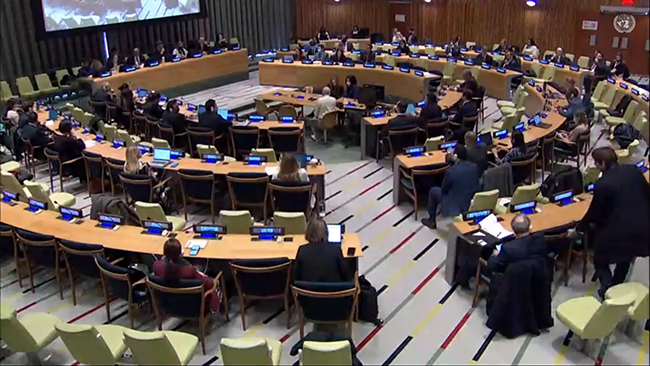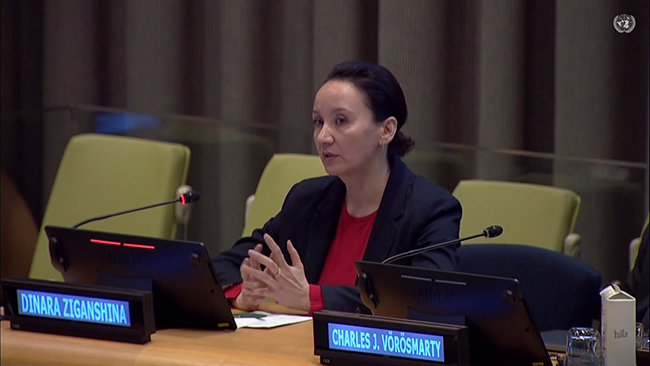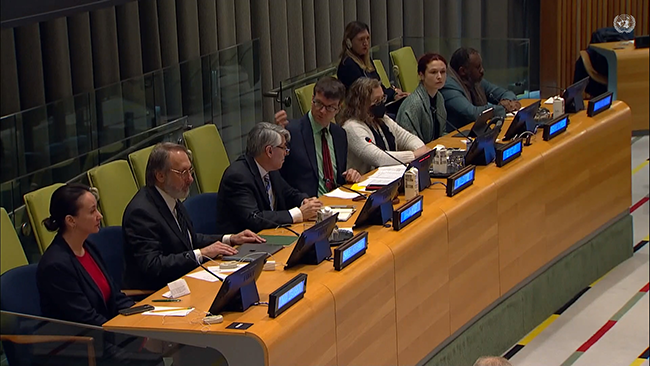SIC ICWC TOOK PART IN AN INFORMAL PLENARY MEETING OF THE 77 UN GENERAL ASSEMBLY
The event was organized on February 7 upon initiative of the H.E. Mr. Csaba Korosi, President of the General Assembly. Members States, Observers of the General Assembly and ECOSOC accredited NGOs were invited to the informal meeting.

The meeting was convened to hear briefings from eminent scientists and academics focused on science-based evidence in support of sustainable solutions. In the course of the informal meeting it was demonstrated that the ongoing UN’s transformation program should benefit from science-based evidence and be based on political wisdom of key actors in this process. Efforts taken to meet global challenges, such as climate change, biodiversity loss, etc. showed the clear evidence that science may play a role in decision making on complex issues. Science may support decisions for the Members to contribute to the UN 2023 Water Conference, the pandemic preparedness negotiations as well as the SDG Summit.
The briefings were held in three sessions on Economics of Water; Shared Waters: Climate, Conflict and Cooperation; and Early Warning for Pandemic Preparedness.
During the first session, it was demonstrated that all communities and nations are hydrologically intertwined – not just by rivers and the surface water, but also through atmospheric moisture flows. Practices in any one region impact rainfall in others. Unchecked, the crisis of global water will endanger all the SDGs. Putting global water on a stable and equitable footing must therefore be a collective responsibility.
The Global Commission on the Economics of Water (GCEW), established in May 2022, presented key points of its first report to be officially launched at the UN 2023 Water Conference. It proposed broad transformations in the way we value and manage water to achieve collective goals, incorporating a central role for science and in line with Agenda 2030, the Paris Climate Agreement, and the Convention for Global Biodiversity.
GCEW showed the criticality of the Water Action Agenda; highlighted the need for the global water cycle to be managed as a global common good and safeguarded through effective multilateralism; and illustrated the shifts in governance that would open up major new opportunities for innovation and investment in more efficient, just and sustainable use of water at all levels.
The second session “Shared Waters: Climate, Conflict and Cooperation” demonstrated that climate is water and wise management of water is conflict management. To ensure that needs of the people and ecosystems that rely on this critical resource are met effectively, a comprehensive understanding of both water science and water diplomacy is required. To prevent water conflicts, it is necessary to unite efforts in development of international water law and water diplomacy, backed by evidence-based capacity-building, and environmental peacebuilding.
Dinara Ziganshina, Director of SIC ICWC reported on the role of the international water law and diplomacy at this session. She underlined that international law makes a valuable contribution to peaceful settlement of water issues by outlining due conduct and providing procedures of cooperation (information exchange, monitoring, joint assessments, notification on planned actions). However, it is necessary to further strengthen the implementation of international water norms and develop the international water law in line with imperatives of our time. For effective implementation of international treaties, strong actions are required from the side of states and bodies of water and environmental conventions to increase coordination and integrated implementation. It is important to raise legal awareness through training and joint research and promote the value of water as a tool of peace and stability on UN stages.

The participants of the session made the following recommendations:
- More widely recognize and demonstrate the benefits of water cooperation;
- Support institutions involved in prevention, mitigation and settlements of conflicts related to water sharing;
- Create an evidence-based system for understanding and monitoring of water conflict risks and extending cooperation (global cooperation on water science and diplomacy).
The first session “The challenges and opportunities in creating an early warning system for global pandemics” showed that without adequate foresight, biological risks will continue to translate into global shocks in the post-pandemic world. Climate and environmental stressors will intensify these shocks but these can be predicted to a large degree. Therefore, the world needs science-informed responses that will be based on early warning systems that leverage modern logistics of data, democratization of AI tools. Today we still can capitalize on new technological developments and create a platform for better management of future disease outbreaks.
Finally, the update on the 2023 Global Sustainable Development Report prepared by a group of independent scientists was presented. It provides decision-makers with the latest input of science in support of the preparations for and the political declaration of the SDG Summit at the end of 2023.

Based on UN materials
|